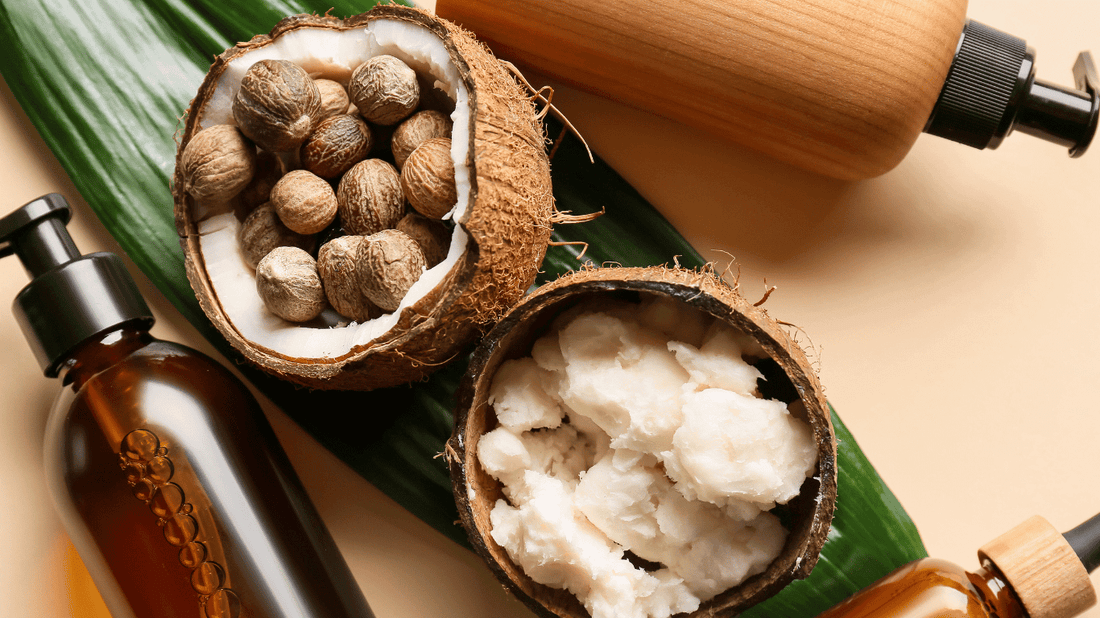Shea Butter: A Timeless Treasure for Skin Health
Extracted from the nuts of the African shea tree, shea butter is a natural emollient known for its profound moisturising abilities. Native to sub-Saharan Africa, the kernels of shea trees have been traditionally harnessed for their beneficial properties in skincare. The pure, unrefined form of shea butter preserves the integrity of fatty acids, vitamins, and minerals that are essential for skin health, making pure shea butter for skin a must-have in any holistic beauty routine.
Shea Butter Benefits for Skin
Shea butter is celebrated for its rich concentration of natural vitamins and fatty acids, which collectively contribute to its superior moisturising properties. This makes shea butter an ideal choice for anyone seeking to enhance their skin barrier against environmental pollutants and dryness. Additionally, the anti-inflammatory properties of shea butter help soothe and calm skin conditions like eczema, making it a versatile addition to skincare regimes across all seasons. Here are the key benefits of shea butter for skin, detailed to give you a comprehensive understanding of why it's such a favoured ingredient in skincare:

Intense Moisturisation
- Deep Hydration: Shea butter is highly emollient, effectively sealing moisture into the skin. This is especially beneficial for dry and dehydrated skin types.
- Barrier Protection: Its rich texture forms a protective barrier on the surface of the skin. This barrier helps to prevent water loss and keeps the skin hydrated for a longer duration.
- Softens Skin: Regular application of shea butter can leave the skin feeling soft, smooth, and supple due to its moisturising properties.
Anti-inflammatory Properties
- Reduces Inflammation: Shea butter contains several anti-inflammatory agents, including cinnamic acid, which helps reduce redness and swelling.
- Soothes Skin Conditions: It is particularly effective in soothing conditions like eczema, dermatitis, and psoriasis, reducing irritation and itchiness associated with these disorders.
Antioxidant Benefits
- Fights Free Radicals: Rich in vitamins A and E, shea butter has strong antioxidant properties that help combat free radicals, which are responsible for ageing and tissue damage.
- Skin Repair and Cell Regeneration: These vitamins also promote healing and rejuvenation, encouraging the growth of healthy skin cells and improving the skin's overall appearance.
Anti-Ageing Effects
- Collagen Production: Shea butter aids in the natural collagen production of the skin, which helps reduce wrinkles and fine lines and maintain a youthful appearance.
- Elasticity Improvement: The consistent use of shea butter can enhance the skin's elasticity, making it more pliable and reducing signs of ageing.

Healing Properties
- Skin Recovery: Shea butter is known for its healing properties, which are able to remedy dry skin, minor cuts, and scrapes quickly.
- Scar Reduction: It can help reduce the appearance of scars and skin discolourations by promoting healthy skin growth and repair.
Natural Protection
-
UV Protection: While not a substitute for sunscreen, shea butter does offer some UV protection with an SPF of about 3-4. This makes it a good supplement to sun protection, particularly for everyday incidental exposure.
Safe for Sensitive Skin
- Hypoallergenic: The natural properties of shea butter make it safe for sensitive skin types, rarely causing allergic reactions or irritations.
- Non-Comedogenic: Unlike many other moisturisers that can clog pores, shea butter is non-comprehending, making it suitable for people with oily or acne-prone skin.
Antioxidants in Shea Butter: Natural Anti-Ageing Solutions
Rich in vitamins A and E, shea butter offers more than just moisturisation. These antioxidants protect the skin from oxidative stress that leads to premature ageing, thus supporting the skin's youthful elasticity and natural glow. The antioxidant benefits of shea butter not only prevent the damaging effects of free radicals but also nourish the skin deeply, making shea butter beneficial for the skin, which is particularly revered in the realm of natural skincare.
Shea Butter versus Other Natural Oils
Compared to other natural oils, shea butter stands out for its non-comprehending properties, which means it doesn't clog pores, making it suitable for almost every skin type. Unlike coconut oil, which can be too heavy for oily skin, shea butter provides deep moisturisation without the risk of exacerbating acne or oiliness, thus showcasing the unique benefits of shea butter for the skin. Here's a detailed comparison between shea butter and other popular natural oils like coconut oil, jojoba oil, and argan oil:

Moisturising Properties
- Shea Butter: Exceptionally moisturising due to its rich content of fatty acids and natural emollients. It effectively hydrates the skin and createsIt's a barrier that locks in moisture.
- Coconut Oil: Also highly moisturising and creates a barrier on the skin, but it can be comedogenic (pore-clogging) for some skin types, especially those that are acne-prone.
- Jojoba Oil: Closely mimics the skin's natural oils, making it less greasy and very effective for all skin types, including oily and acne-prone skin.
- Argan Oil: Excellent for hydration but lighter than shea butter and coconut oil, making it suitable for normal to dry skin types.
Anti-inflammatory Properties
- Shea Butter: Contains cinnamic acid, which provides anti-inflammatory benefits, helping to soothe skin irritation and conditions like eczema.
- Coconut Oil: Has anti-inflammatory properties but may irritate sensitive skin due to its comedogenic nature.
- Jojoba Oil: Known for its soothing effects on the skin, reducing inflammation without clogging pores.
- Argan Oil: Also anti-inflammatory, good for reducing redness and irritation, commonly used in anti-ageing skin products.
Antioxidant Content
- Shea Butter: High in vitamins A and E, which are potent antioxidants. These vitamins help protect the skin from oxidative stress and environmental damage.
- Coconut Oil: Contains some antioxidants, though not as high as shea butter, primarily providing moisturizing benefits.
- Jojoba Oil: Contains vitamin E, but not as prominently as shea butter.
- Argan Oil: Rich in vitamin E, making it excellent for repairing damaged skin and providing anti-ageing benefits.
Skin Healing and Regeneration
- Shea Butter: Promotes the skin's natural collagen production, aids in skin cell regeneration, and can help reduce the appearance of scars and stretch marks.
- Coconut Oil: Supports wound healing due to its antibacterial properties but may exacerbate acne in some individuals.
- Jojoba Oil: Enhances skin repair and regeneration and is often used to heal acne, psoriasis, and sunburn.
- Argan Oil: Commonly used for its regenerative properties, particularly in hair and skin formulations aimed at repairing and nourishing.
Suitability for Different Skin Types
- Shea Butter: Suitable for all skin types, particularly beneficial for dry and ageing skin due to its intensely moisturising and regenerative properties.
- Coconut Oil: Best for dry skin but should be used cautiously by those with acne-prone skin.
- Jojoba Oil: Highly versatile, suitable for all skin types, including oily and sensitive skin.
- Argan Oil: Great for most skin types, especially beneficial for ageing skin due to its nourishing and regenerative qualities.
Best Practices for Using Shea Butter on Skin
To reap the full benefits of shea butter for the skin, it is advisable to use it in its unrefined form. Unrefined or raw shea butter retains more nutrients compared to its refined counterparts, which often lose many therapeutic properties during processing. For application, warming the butter between your fingers can help spread it evenly, providing an effective barrier that locks in moisture and nourishes the skin cells.

Considering Shea Butter for Allergic Reactions and Sensitivities
It is important to note that while shea butter is generally safe and allergen-free, individuals with latex allergies should proceed cautiously if using raw shea butter, which might contain latex. Otherwise, shea butter is a gentle and effective moisturizer for sensitive skin, free from the proteins that typically trigger nut allergies.
Incorporating Shea Butter into Your Beauty Routine
Besides its standalone benefits, shea butter is also effective when blended with other natural ingredients. Combining shea butter with oils like jojoba or almond can enhance its spreadability and add additional hydrating benefits. Shea butter is a cornerstone ingredient for those looking to improve their skincare with natural, effective solutions, whether used alone or as part of a blend.
Eco-Friendly Skincare Solutions: The natrl skincare Approach
In line with using natural ingredients like shea butter for skin, natrl skincare introduces an eco-friendly solution with their Natural Shampoo Bar. This product complements the natural, zero-waste lifestyle, utilising sustainable practices without compromising quality and effectiveness. The shampoo bar is enriched with natural ingredients that promote healthy hair and scalp, aligning perfectly with the principles of using pure shea butter for skin for holistic beauty care.

By choosing natrl skincare products, you're embracing an eco-friendly beauty routine and supporting sustainable practices that benefit the environment. Their commitment to quality and nature is evident in every product, offering a responsible choice for conscious consumers.


 Whatsapp us!
Whatsapp us!